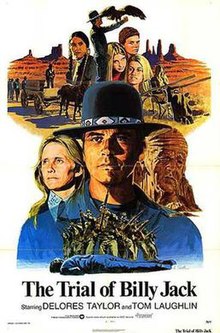The Trial of Billy Jack
| The Trial of Billy Jack | |
|---|---|

Theatrical release poster
|
|
| Directed by | Tom Laughlin |
| Produced by | Joe Cramer |
| Written by | Frank Christina Teresa Christina (pen names for Tom Laughlin and Delores Taylor) |
| Starring | Tom Laughlin George Aguilar |
| Music by | Elmer Bernstein |
| Cinematography | Jack A. Marta |
| Edited by | Michael Economou George Grenville Michael Kahn Michael Karr Jules Nayfack Tom Rolf Toni Rolf |
| Distributed by | Taylor-Laughlin Warner Bros. |
|
Release date
|
|
|
Running time
|
170 min |
| Country | United States |
| Language | English |
| Budget | $7,800,000 (estimated) |
| Box office | $89,000,000 |
The Trial of Billy Jack is a 1974 film starring Delores Taylor and Tom Laughlin. It is the sequel to the 1971 film Billy Jack and the third film overall in the series. Although commercially successful, it was panned by critics. The film was included as one of the choices in the book The Fifty Worst Films of All Time. Directed by Laughlin, it has a running time of nearly three hours.
Billy Jack (Tom Laughlin) goes to court facing an involuntary manslaughter charge stemming from events in the earlier film. He is found guilty and sentenced to a prison term. Meanwhile, the kids at the Freedom School—an experimental school for runaways and troubled youth on a Native American reservation in Arizona—vow to rebuild the school. They raise funds and acquire a new building, eventually starting their own newspaper and television station. Inspired by Nader's Raiders, they begin using the newspaper and TV station to conduct investigative reporting, angering several politicians and townspeople in the process with their exposés.
The school's activities range from having their own search and rescue team, to artistic endeavors such as a marching band and belly dancing. This culminates with the school hosting a large marching band contest and arts festival, which they call "1984 is Closer Than You Think", to raise money for the school.
Midway through the film, Billy Jack is released from prison and, trying to reconnect with his spiritual beliefs, begins a series of lengthy vision quests. He gets involved in a radical group on the reservation which is trying to oppose the federal de-recognition of their tribe and the turning of their tribal lands over to local developers. When one of the tribal members is arrested for poaching deer on what was formerly tribal land, the school comes to his defense.
...
Wikipedia
